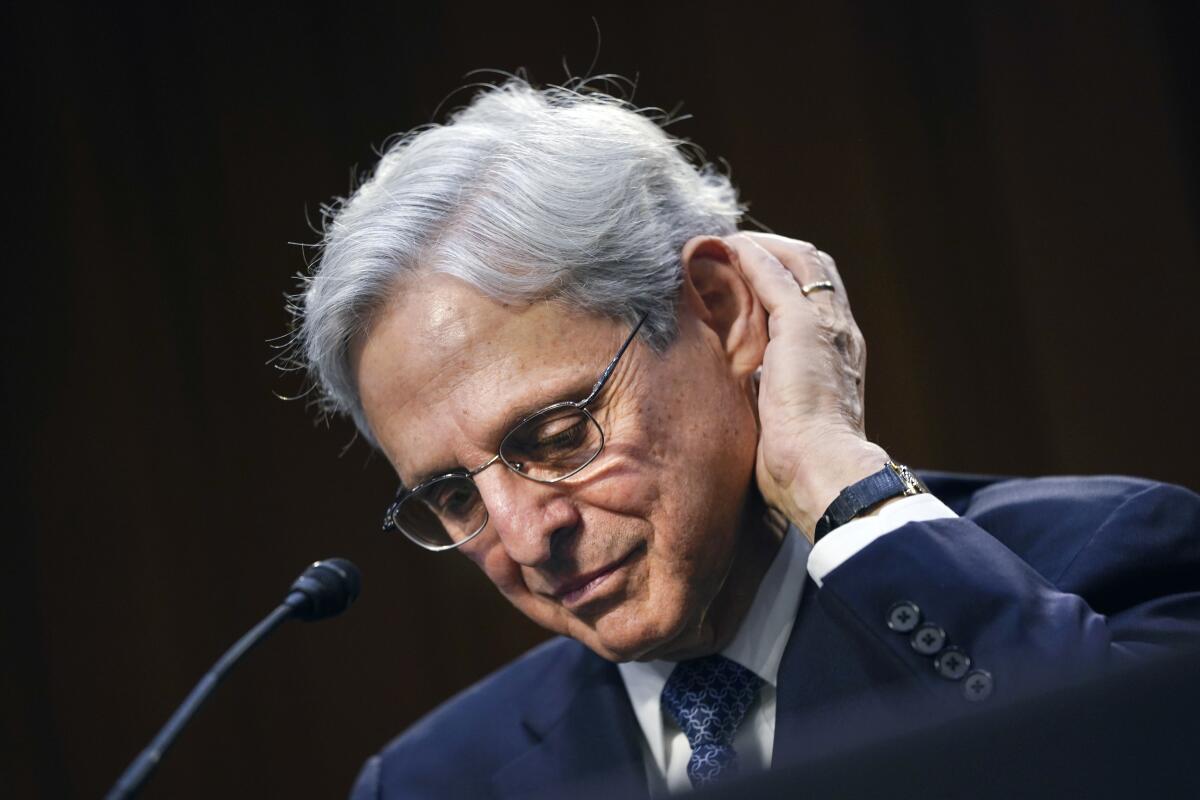Column: Merrick Garland can’t avoid investigating Trump-era abuses now

- Share via
Merrick Garland made it clear at his confirmation hearings that he was determined to be consummately apolitical as attorney general. That would generally mean steering clear of efforts to investigate and redress the abuses of the Department of Justice under former President Trump.
But circumstances are conspiring against Garland’s plan.
The reports of Trump Justice Department subpoenas aimed at the phone and email records of journalists and perceived adversaries — including Rep. Adam B. Schiff (D-Burbank), Eric Swalwell (D-Dublin) and even White House counsel Don McGahn — are the latest shocks that up the pressure on Garland to make the Trump years more his focus. They follow a series of DOJ decisions that reaffirmed legal positions of the prior administration’s department, to the consternation of progressives.
Most controversially, the department is appealing a district court ruling that would allow E. Jean Carroll’s defamation suit against Trump to go forward.
A federal judge in Manhattan found that sneering comments made by the then-president about Carroll (who accuses Trump of rape, an allegation he denies) didn’t fall under “the scope of employment” of the leader of the free world. That meant the government could not take over as the defendant in the case.
However, if the district court ruling is overturned, and the government can “intervene” on Trump’s behalf, Carroll’s case goes no further — the federal government is immune from defamation claims.
In defending that appeal and other litigation decisions in testimony before the Senate Appropriations subcommittee last week, Garland made clear that his intent was to apply the law, not to “back any administration, previous or present.”
In the Carroll case, for example, Justice Department rules dictate that acting Solicitor General Elizabeth Prelogar preside over such decisions, and Garland’s “stay in your lane” adherence to such practices makes it unlikely he would have swooped in to overrule her. Prelogar’s role seems to be lost on critics of the department’s adherence to Trump-era litigation, who are quick to ascribe the decisions to Garland personally.
Garland also must recognize, as does the White House, that pursuing a truth-and-reconciliation agenda against the Trump administration could unleash attack dogs on the department and complicate its ability to carry out the tasks he considers essential to his tenure, starting with a full investigation and prosecution of the Jan. 6 insurrection.
No matter. The subpoena revelations, coming on the heels of the Carroll decision, are turning Garland, however reluctantly, toward disinterring the past.
The pressure on Garland is all the stronger because, with Congress in hopeless stalemate and Republican legislators determined to resist any examination of the Trump years, there is no government actor better positioned than the attorney general to uncover the facts about the abuses of the last four years.
Garland finds himself in the role of a Jimmy Stewart hero in a John Ford western, content to bring the law to the frontier but wanting no part of a confrontation with a Lee Marvin villain whose gang previously pillaged the community. Until the townspeople plead with him that he’s their only hope.
So Garland is responding. Not, importantly, in altering the decisions of his staff in ongoing cases from the Trump era. (Don’t look for a reversal on the Carroll appeal.) But the department quickly announced an investigation into its attempts to obtain phone and email data, and an overhaul of its approach to subpoenaing records of journalists and members of Congress. The investigation, conducted by the DOJ’s Office of Professional Responsibility, guarantees a year-plus trip into the darkest recesses of the previous administration, with the public focused intently on the verdict.
And Garland is also stepping into the breach in voting rights enforcement created by the Republicans’ embrace of the Big Lie and the probable death-by-filibuster of two Democrat-sponsored voting rights bills. He unveiled an ambitious plan to double the Justice Department’s voting rights enforcement staff, in part to scrutinize new, restrictive election laws spreading like wildfire in GOP-controlled states.
On his first day as attorney general, Garland expressly referenced another steadfastly apolitical AG, Edward Levi, who famously steadied the department and restored its professionalism after the corruption of the Nixon years, which landed then-Atty. Gen. John Mitchell in jail.
But in 2021, the Levi model doesn’t quite work.
When Levi took office, President Nixon’s separation from politics and society was complete. His post-Watergate conduct, slinking into exile and remaining there for many years, signaled his acceptance of the public verdict of his guilt and a healthy sense of shame.
Exactly the opposite is true with Trump, who continues to haunt the country and a Republican Party that is without remorse or shame over its role in enabling his abuses.
Adhering too closely to Levi’s apolitical model would itself be a political choice in today’s climate. As more evidence of Trump’s evisceration of the rule of law comes to light — and it will — we need government to tell us what happened and do something about it.
It’s not a job Garland signed on for, and not one he is eager to take on, but he is stepping up to it.
@HarryLitman
More to Read
A cure for the common opinion
Get thought-provoking perspectives with our weekly newsletter.
You may occasionally receive promotional content from the Los Angeles Times.











